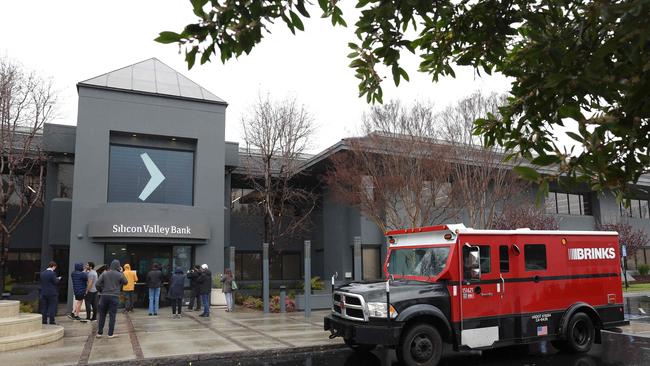
The US has protections in place for big banks that are classified “too big to fail”, but not smaller ones.
Almost certainly there will be a withdrawal of deposits from many smaller banks and the extent of this withdrawal will determine just how far the impacts of the Silicon Valley disaster spread.
Widespread US damage is possible but US regulators are working on a scheme to protect Silicon Valley non-insured depositors and therefore limit the repercussions to other smaller bank deposits.
The US Federal Reserve will need to monitor developments very carefully because the possible carnage has the potential to be a much more powerful economic depressant than interest rate rises.
On Friday there was a rush to buy US bonds and yields fell partly because investors were racing for safety but also because they realised that a string of smaller bank failures would completely change the interest rate/economic outlook
Silicon Valley enterprises that believed they had sufficient cash are suddenly drained of liquid funds and must retrench staff on a massive scale.
Accordingly the global skills shortage of top technology people is now over, at least for the short term.
Meanwhile a series of US high tech companies are announcing that a substantial portion of their much needed deposits a caught in Silicon Valley Bank.
The hi-tech scene will not suddenly return to normal after the initial damage but the long-term damage will not be catastrophic, given the US appetite for new technology to lift productivity.
The US is engaged in a technology race with China and there are signs that it’s catching up but the massive blow set to hit Silicon Valley will a severe US set back but in time it will recover.
Meanwhile on the fringe of the collapse will be the crypto market. Not surprisingly the Silicon Valley bank and some of the crypto currencies are linked.
Lines of credit that were vital for long term technology investment will be destroyed and in the medium term the technology companies will have to negotiate new banking loans. There will also be carnage in private equity. Both the private equity sector and the technology companies are closely into interwoven. Money was drying up even before the crash. Now that tap will be turned tighter. Australian tech companies that are short of cash will be hit just as hard as those in the US
One of the reasons the Silicon Valley Bank failed was that technology companies were finding demand dropping markedly in line with the declining US economy.
The consequent increase in their cash burn reduced the bank’s deposits prior to the scare forcing the bank to sell US bonds and crystallise big losses. Many other smaller US banks have the same problem.
The banking administrators and now trying to find a buyer for the Silicon Valley bank but no preparatory work has been undertaken because the crash was caused by a sudden run on deposits.
Anyone looking to buy the bank will almost certainly face a mountain of problem loans to the Silicon Valley tech sector.
In Australia where there were some rather sombre barbecues among tech people over the weekend.
Given the enormous demand and skyrocketing salaries of technology people, the tech sector had thought itself immune from the current community ravages.
Over the last two years, highly rewarded technology executives discarded their normal caution and were among the leaders taking out large mortgages. The retrenchments at Xero and Atlassian have created deep nervousness in the community.

As in the US, Australian enterprises with a technology bent have recently been having greater difficulty raising capital and so are cutting back their expenditure.
There has been a dramatic slowing in the payment of debts around the country including large companies cutting back payments to smaller enterprises, including technology suppliers.
Those companies with major spending plans that raised sufficient capital are in good shape but those with limited cash and increasing cash burn are worried, and are cutting back expenditures.
In the frontline of cuts is the need to retrench labour which is a horrible morale crushing process. Every employee thinks they may be vulnerable and then feels guilty if they are not chosen when their friends are retrenched and can’t find a job. If the Silicon Valley Bank collapses, that problem will accelerate but even if it survives it is not going to go away and it is set to get worse.
Meanwhile all those companies led by Atlassian that have extensive dealings with the Silicon Valley sector are on the edge of their seats because, if there is a collapse they, will not escape the repercussions.
With the benefit of hindsight we can declare that the top of the tech market was signalled when Atlassian’s co-founder/CEO Mike Cannon-Brookes set off on his bizarre attempt to gain control of AGL Energy. It looked madness at the time but given what was ahead it was actually dangerous because it took the co-founder’s attention away from the fact that the loss making company was overstaffed and facing headwinds.







US Treasury secretary Janet Yellen in deciding not to rescue Silicon Valley Bank depositors has set off a series of repercussions that will impact the entire world.